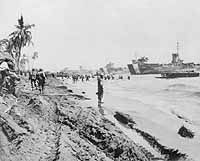| American troops landing on a south Pacific beach during World War II. Sometimes there was little opposition, other times there was a great deal and the troops suffered many casualties. |
My platoon landed in the first wave on Guam between Agat and Bangi Point. We encountered many obstacles the first day, which is not the story I am about to tell.
On the second day, our Company, “F.” was pulled out of the line and briefed on making a forced march across the island to Talafofo Bay.
We were told an internment camp was there and to take it as fast as we could, to keep the Japanese from retaliating against the people interned. It was understood there were about 5000 prisoners.
Right from the start it was a mission of destiny. We went on forced march clear across the island without encountering any enemy resistance which was amazing.
When we arrived at Talafofo Bay we saw many houses and shacks. We started going through the houses systematically to find the Japanese who were guarding this camp. Luck was with us against There were only nine Japanese in charge of it. We found them all in one house and killed them, without suffering even one casualty.
The internees realized at once they were free. We were immediately mobbed by hundreds of happy people. It was a good thing we had gotten rid of the Japanese all at once, because we couldn’t move for the press of prisoners around us. Their reaction was uplifting. The first thing they did was sing “Star Spangled Banner,” ‘God Bless America,” “The Marine Corps Hymn,” etc. There wasn’t a dry eye in the crowd. It was the most inspiring thing that ever happened to me.
After things calmed down we started to find out about these people. Some were servicemen who had passed themselves off as Guam natives, while others were wives of servicemen, nurses, civilians, natives and government employees.
I will never forget in about half an hour after we took command, we saw a sailor in whites. He walked up to our Lieutenant McNeil and saluted him.
“Seaman so and so reporting for duty, Sir” This sailer had managed to hide his uniform all during the occupation.
All of the prisoners had stories to tell of atrocities committed against them during the occupation.
When we went on this mission of mercy. We didn’t take enough chow or cigarettes with us for as long as it took us to do the job. We were there longer than was expected so we ran out of everything. The first things we gave away were our cigarettes and D-bars. They hadn’t had candy for a long time. So even those old D-bars made a big hit.
During other operations we had chow dropped to us but without parachutes. The planes would come over and shove cases of C-rations out, and there would be a couple of cans that were not broken. They also dropped Chelsea cigarettes to us.
The people in this camp were forced to raise food for the Japanese. After we liberated them they broke into the granaries and distributed the grain to the people. They even killed a water buffalo and barbecued it for us.
Our doctors and corpsmen tended to the ill and wounded while we prepared to take these people back behind the lines. To show again how lucky an operation this was we only had to kill two more Japanese, who were walking up a road at night.
As I recall, we were about four days getting back behind the lines with our charges. Some had been wounded during the pre-invasion bombardment. We put those who couldn’t walk in two-wheeled carts, which were pulled by their water buffalo. We were quite a procession going back across the island
When we got behind our lines, there was more rejoicing and praying for the safe return of these people.
I heard later that within a few days of our return our doctors delivered several babies to some of the women we had brought back.
When we got back behind our lines we continued to help take the rest of Guam.
I was a member of the 4th Raiders from the start, and we landed on five different islands as 4th Raiders, 4th Battalion. 1st Provisional Brigade and 6th Division. In all this time I saw a lot of men killed and wounded, but this was one time that must have been watched over by a Higher Being, for we got through this mission of mercy without any casualtiesat all.

